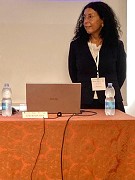

|
Fri25 Jul11:00am(15 mins)
|
Where:
828
Presenter:
|

“This award honours their suffering, their pain. They disappeared into obscurity in Stalinist camps, in the mines of Magadan and Vorkuta; they were shot in the back of the head in the torture chambers of the NKVD; and they perished in the Second World War and in other wars the empire fought. The great idea devoured its own children without mercy”. With these words Svetlana Alexievich starts her speech at the Nobel Banquet, on 10 December 2015, defining the Prize “as a tribute to the many generations who not so very long ago lived together in a Marxist laboratory of the bright future – that huge country called the U.S.S.R”. This paper aims to analyze the modes of representation of this “laboratory” in Alexievich's works, in particular Voices from Chernobyl (Chernobylskaya molitva, 1997) and Secondhand Time: The Last of the Soviets (Vremya sèkond kend. Konets sovetskogo cheloveka, 2013). Among the six books composing the “Chronicle of the Big Utopia”, or the “History of the Red Man”, these two works present two exemplary cases of “disruption” from different points of view: historical, social, existential, communicational, and expressive. In Voices from Chernobyl, the spread of the nuclear disaster is directly witnessed by the voices of the hit population. The text is a living theatre of traumatic memory collecting the oral stories about the progressive penetration of the radioactive contamination in the air, in the earth, in the bodies of people and animals, and about the killing and contaminating failure of Soviet institutions. The explosion of Chernobyl – which affected the Belarusian writer personally – is also the narrative of the crumbling of the communist faith in being part of a unique people. “From the very first”, says Nadezhda, an evacuee from Pripyat, “I felt that we were Chernobylites, that we were already a separate people”. Furthermore, the “collective mourning” of these private voices shows the fragility of language in front of the unspeakable. Debunking the mass media discourse, the liar public display of the catastrophe, it attempts to express the trauma with disrupted words. Second Hand Time reports the voices of women and men of different generations who are dealing with the collapse of the USSR and the complete upheaval of their daily world and their deepest beliefs passed down from generation to generation. In this crowded chorus, very different intonations and accents resonate due to the various professional and geographical origins of the narrators, but many themes unite these lives. From the many stories repeatedly emerges a faith in the ideal of socialism shared by many who were already mature or elderly at the time of perestroika. Equally common and recurrent is the call for hope in freedom that turns into its “weight”, and therefore into the bitter realization of freedom as consumption. But, in the most aware, this hope becomes a necessary path yet to be undertaken.